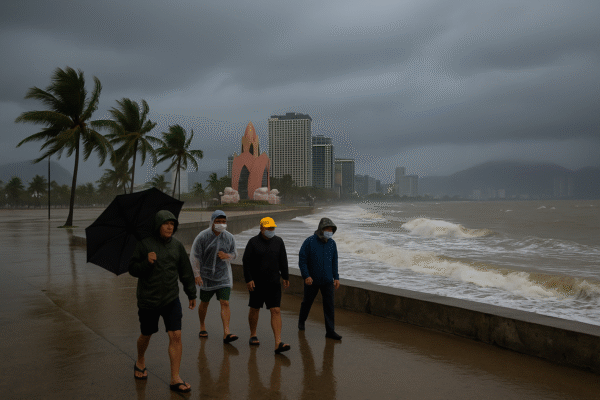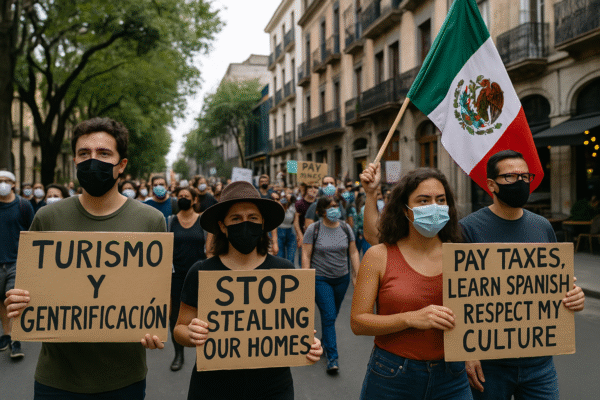Mexico City is facing a mounting backlash from residents as the growing influx of American tourists and digital nomads reshapes the urban fabric of the capital. Over the past weekend, hundreds of protesters filled the streets of popular neighborhoods such as Roma and Condesa, demanding urgent action to address what they describe as an escalating housing and cultural crisis fueled by overtourism and foreign gentrification.
The protests, which also targeted the U.S. Embassy and transit stations, underscored local frustration over skyrocketing rents, displacement of long-term residents, and a perceived erasure of authentic Mexican culture in favor of international tastes. Protesters carried placards with messages like “Gringos, stop stealing our home” and “Pay taxes, learn Spanish, respect our culture,” reflecting widespread discontent.
Surging U.S. Tourism and Remote Work Migration
The tourism boom from the United States, amplified by the post-pandemic surge in remote work, has turned Mexico into a haven for digital nomads seeking lower living costs and lenient visa policies. According to U.S. State Department figures, the number of American expats living in Mexico rose by 70% between 2019 and 2023, reaching nearly 1.6 million.
Mexico City, in particular, has become a magnet for remote workers due to its affordable cost of living compared to major U.S. cities. Neighborhoods such as Roma Norte, Condesa, and Juárez have transformed into bustling hubs of international cafes, coworking spaces, and boutique hotels — but locals argue these changes are not coming without a cost.
“Places I grew up in are now unaffordable,” said Michelle Castro, a university student from a historically working-class district. “My family’s rent tripled in just four years. All the new businesses cater to foreigners.”
Housing Inequality and Short-Term Rentals
One of the most pressing concerns voiced by protesters is the housing shortage caused by short-term rentals. Platforms like Airbnb have exploded in popularity, allowing property owners to earn significantly more from tourists than from local tenants. This shift has dramatically reduced long-term housing availability and driven up rents across the city.
The Mexican Federal Consumer Protection Agency (PROFECO) has acknowledged that the rapid growth of short-term rental markets poses a regulatory challenge. In neighborhoods like Condesa, studies from the Mexico City government reveal that up to 40% of available units are now listed as short-term rentals.
A recent report also highlighted how unchecked tourism can lead to economic inequality, urging cities to create balanced frameworks that protect residents while supporting the travel sector.
Calls for Reform: Tourism Laws and Housing Protections
Protesters and advocacy groups are urging the Mexico City government to adopt several policy measures:
- Cap on Airbnb-style short-term rentals to ensure more availability for long-term residents.
- Taxation or special permits for foreign residents and investors, aimed at deterring speculative real estate purchases.
- Rent subsidies for low-income families to prevent forced evictions and displacement.
- Cultural education campaigns directed at foreign visitors to foster respectful engagement.
- Community-first urban planning to preserve the identity of local neighborhoods.
Mexico City authorities have not yet responded directly to the weekend’s protests, but discussions around regulating Airbnb and foreign investment are underway in the City Council. In 2022, the city signed a controversial agreement with Airbnb and UNESCO to promote “cultural tourism” — a move critics argue further prioritizes tourist dollars over resident wellbeing.
Part of a Global Trend
The unrest in Mexico City echoes a broader trend across global tourism hotspots. In cities like Barcelona, Venice, and Amsterdam, local governments have begun limiting cruise arrivals, capping short-term rental permits, and taxing tourists to curb overtourism. Spanish island protests this summer saw activists spraying tourists with water guns in symbolic resistance to the overwhelming visitor numbers.
In Lisbon, Portugal, similar protests have erupted over the pricing-out of locals by European and North American expats. Like Mexico City, these cities are learning that unrestricted tourism and relocation can erode the very local culture that draws visitors in the first place.
Balancing Tourism and Community
Most Mexico City protesters insist their movement is not anti-tourist. Rather, they are advocating for a more sustainable model of tourism that includes and protects local communities. “We want balance — where locals, tourists, and expats can all coexist without excluding one another,” said one demonstrator in Condesa.
Mexico’s federal government, through its Ministry of Tourism (SECTUR), has recently highlighted the need for “inclusive tourism development,” a policy framework that promotes investment while safeguarding social equity. But critics argue local governments must act faster to prevent irreversible changes to neighborhood dynamics.
The Path Forward
As Mexico City continues to attract remote workers and U.S. travelers in record numbers, pressure is mounting on local authorities to implement urgent housing and tourism reforms. Without decisive action, residents fear that the soul of Mexico City — known for its hospitality, heritage, and diversity — may be lost to unchecked gentrification and commodification.
The protests mark a critical turning point for the city and could serve as a lesson for other destinations navigating the fine line between welcoming visitors and protecting the integrity of local life.
For more travel news like this, keep reading Global Travel Wire















